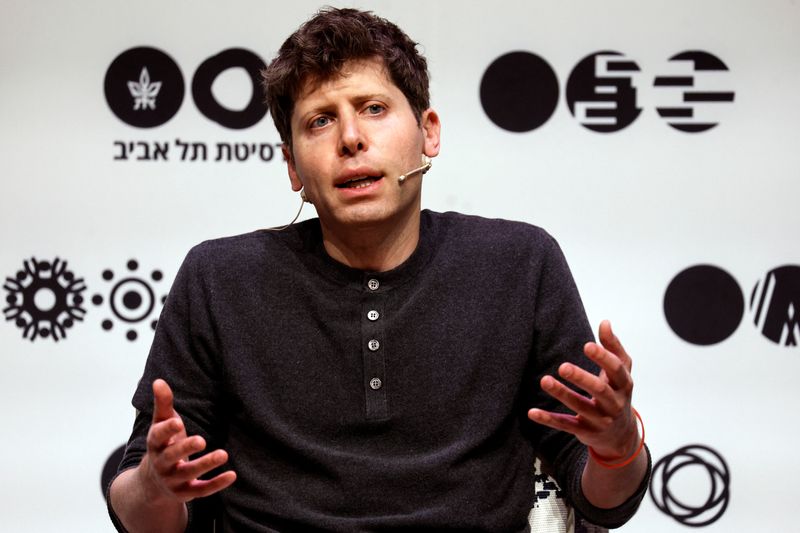(This Nov. 18 story has been refiled to correct the spelling of 'Khosla' in paragraph 6)
By Anna Tong, Krystal Hu and Jeffrey Dastin
(Reuters) - Sam Altman, the just ousted CEO of OpenAI, is discussing a possible return to the company behind the ChatGPT bot even as he considers launching a new artificial intelligence (AI) venture, a person briefed on the matter said on Saturday.
A day after the board fired him in a surprise move that rocked the tech world, Altman was talking with OpenAI executives about improving the company's governance structure while he discusses with some core OpenAI researchers and others loyal to Altman how they could start a new AI company, the person said.
The possibilities of a return or a restart for Altman, seen by many as the face of generative AI, are in flux, said the source, who asked not to be named because the source was not authorized to speak on behalf of the parties involved.
OpenAI and Altman did not reply to requests for comment.
Investors in OpenAI, including its biggest backer Microsoft (NASDAQ:MSFT), are discussing damage control, including possibly pushing the board to restore Altman as CEO, fearing a mass exodus of talent without him, other sources said.
Khosla Ventures, an early backer of OpenAI, wants Altman back at OpenAI but "will back him in whatever he does next," the fund's founder Vinod Khosla posted on X on Saturday.
Microsoft declined to comment. It reportedly owns 49% of the company, while other investors and employees control 49%, with 2% owned by OpenAI's nonprofit parent.
Emotions ran high on Saturday as current and former employees were angered by Altman's sacking and worried over how an upcoming $86 billion share sale could be affected by the sudden management upheaval.
OpenAI, a nonprofit co-founded by billionaire Elon Musk, launched ChatGPT on Nov. 30 last year, setting off a global sensation over generative AI technology that quickly became the world's fastest-growing software application. It set off a wave of investments and announcements across industries to use AI to enhance everything from financial services and healthcare to entertainment and media.
Trained on reams of data, generative AI can create human-like content, helping users spin up term papers, complete science homework and even write entire novels. After ChatGPT's launch, regulators scrambled to catch up: the European Union revised its AI Act and the U.S. kicked off AI regulation efforts.
By Saturday, some shell-shocked employees contemplated quitting if Altman was not restored by the end of the weekend, one source said. Others expressed support for joining Altman in starting a company, a third person familiar with the matter said.
Former OpenAI President Greg Brockman, who said he quit OpenAI over Altman's firing on Friday, is expected to join any effort, according to the Information, which earlier reported the possible new venture, citing a person familiar with the matter.
Brockman did not immediately respond to a request for comment. OpenAI did not respond to a request for comment.
Some researchers at OpenAI, including Szymon Sidor, have quit the company over the CEO change, but it was unclear if Sidor and others would join a new Altman venture, two people familiar with the matter said. Sidor confirmed quitting.
Altman and Apple (NASDAQ:AAPL)'s former design chief Jony Ive have been discussing building a new AI hardware device, the Information reported in September. It reported that SoftBank (TYO:9984) CEO Masayoshi Son had been involved in the conversation.

Altman's ouster was over a "breakdown of communications," not "malfeasance," Chief Operating Officer Brad Lightcap wrote in an internal company memo on Saturday that was viewed by Reuters.
Tech website The Verge earlier reported the OpenAI board's discussions with Altman to return as CEO. Forbes reported on Saturday investors were plotting to restore Altman as CEO.